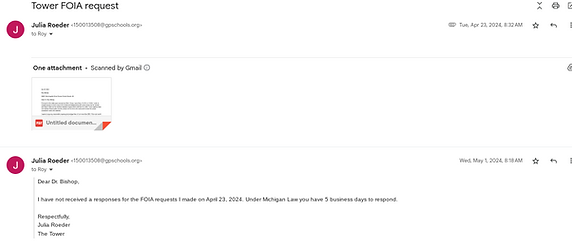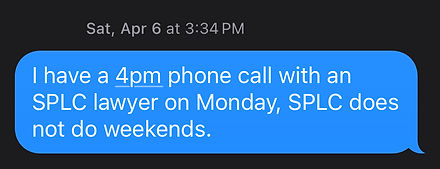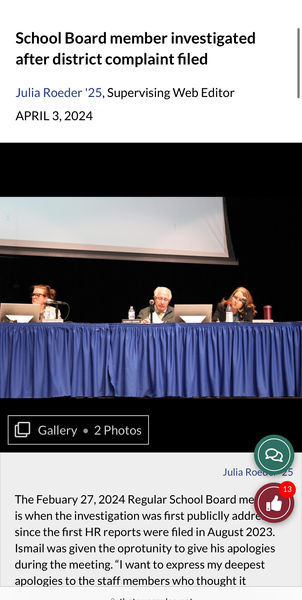Law and Ethics
" I hate writing. I love having written." - Dorothy Parker
This is a quote that I came across, when reading Gene Wiengarten's book, "Fiddler on the Subway." This quote is how I felt as I was writing the story I will soon talk about in this section. It was many early mornings and late nights up working. I sacrificed my chemistry homework to put forth my best effort. In the moment, I could not tell you why I was doing all of it but looking back I know it was a drive I had to follow.
I have decided to use this section of my portfolio to explain the story that led me to winning the Student Press Law Center’s (SPLC) 2024 Freedom of Information Award. The story took nearly two months to complete due to the extensive research I completed.
Before leaving for a week-long break in February of 2023, my advisor pulled me and the print editor-in-chiefs aside. They told me rumblings of a school board member making retaliatory comments against members of administration. At the time of the comments, this specific school board member was the sitting school board president. These comments prompted a third party law firm hired by the board to do an investigation. After this investigation, the third party law firm produced a 27 page report that the district claimed attorney client privilege.
After a week-long break of contemplating how to go about an investigation, I decided to start filing FOIAs to see if I could gain more information from the report. This is an example of one of the many FOIAs I submitted to the district of Grosse Pointe Schools.

After filing multiple unsuccessful FIOAs, it was clear that the district was not going to work with me. There were many times when they denied or did not get back to me within the 5 day limit.


This was a text I sent to my advisor asking what I should do when I had not gotten a response for my FOIA in over five days. Consequently, I emailed the FOIA director to remind him to give me the response.

This was an email I sent to the FOIA coordinator of my school district.
After talking with Mike Hiestand, an on-call lawyer for the SPLC, I understood that denying the report was unlawful. Due to the report being held by a public body, it should be a public. This led me to appeal the FOIA to attempt one last time to force the school board to release the report.

This was the appeal that I filed for the board to vote on. I got help from a community member who is a professional FOIA lawyer. During the meeting that the board voted on, one board member said that the appeal was "incredibly well written".

This was the agenda for the special meeting that was called to vote on my FOIA appeal. The board did not have a FOIA appeal committee prior to me filing my appeal.
Sitting in the audience of the meeting, I knew the board would deny it. And they did. This meant that I had a question: should I sue my school board? After speaking to local journalists and lawyers from the SPLC helpline, it became clear that suing would do more harm than good. It would be likely that I would win the lawsuit, but the repercussions would be harmful to Michigan’s Freedom of Information laws. My case would set a new precedent that would keep public bodies across the state from being transparent with the public. For example, if I had won, in the future the school board would have never made the initial 5 page summary report public.


These were both texts I sent during the time that I spoke to the SPLC hotline.
Throughout this, I was constantly working with and keeping my advisor and editors updated during school board meetings and the entirety of my investigation.
As I was trying to get the report, I published my story surrounding my investigation.
